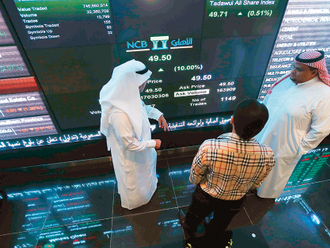Dubai: There will always be times when people struggle with their cash flow and they run to the banks for help. For most UAE expatriates, in particular, savings aren’t enough to pay for a family emergency, buy a car or clear off a pressing credit card debt, so taking out a personal loan becomes the only option.
The good news for those on the lookout for a quick cash injection is that interest rates on borrowings are no longer shooting up these days. According to industry sources, rates have so far “stabilised” and borrowers who do their homework could find some loan deals with manageable yearly charges.
An analysis of the finance options listed on Souqalmal.com showed that interest or profit rates on salary-transfer loans in the UAE have dropped from 7.2 per cent to 6.9 per cent per annum, on average. Interest rates on non-salary transfer loans, however, are still in double digits, dropping marginally from 15 per cent to 14.7 per cent in the last one year.
“Rates seem to have stabilised when compared to early 2015, which saw many banks slashing rates, offering lower processing fees and launching special offers on personal loans in a bid to attract more customers,” Ambareen Musa Founder and CEO Souqalmal.com, told Gulf News.
And if they look hard enough, borrowers could secure a loan deal with annual interest rates as low as 4 per cent to 4.5 per cent based on a reducing balance. “There are many banks offering competitive rates on personal loans, with some even offering [lower than the average],” Musa added.
“The first step in securing a low rate on a personal loan in the UAE is to opt for the salary-transfer option, thereby avoiding the double-digit rates offered to non-salary transfer loan applicants.”
The latest figures released by National Bank of Abu Dhabi (NBAD) suggest that the appetite for finance in the UAE remains strong, with consumer loans alone amounting to Dh417 million in the last quarter of 2015, compared to Dh390 million in the first quarter last year.The amount represents personal loans for business and consumption, including all credit card debt and car loans.
An earlier research by Strategic Analysis claimed that the average household debt in the UAE is Dh348,000 ($95,000) or $114 billion in total, but Alp Eke, senior economist at NBAD, dismissed the figure as “too excessive”, citing that their latest numbers indicate that every person in the UAE owes a bank or lender only about Dh41,000.
Financial planners had earlier blamed excessive use of credit cards, driven mostly by residents’ lavish lifestyle, for the growth in consumer debt in the UAE. However, Musa noted that high living costs are another contributing factor that drive consumers to borrow money.
“Rents have only dropped marginally in certain areas in Dubai in the last one year, after registering a rapid increase in the previous years. Other expenses impacting the cost of living in the UAE include steadily rising school fees with the most recent school fee hike ranging from 3.2 per cent to 6.4 per cent. These factors have contributed to an increased demand for personal loans in the UAE,” Musa pointed out.
But it looks like the prices of goods, services and other living essentials in the UAE are generally on a decline, with Dubai’s inflation rate dropping to 1.9 per cent in January and forecast to post further declines this year.
“In 2016, in my opinion [inflation] will be between 1.5 per cent to 2 per cent,” Eke said.








